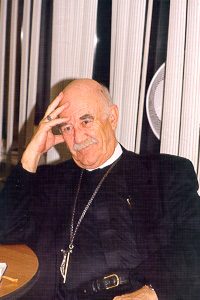I knew Dr. Korby though not well. I knew him through the sainted pastor the Rev. Charles Evanson, my mentor and friend of many years. Evanson served with Korby in Chicago, attended Valpo while Korby taught there, and served with him in the English District of the LCMS. Though I am forever grateful for the tutelage of Father Evanson, I am also grateful for his introduction to pastors and teachers I might not have known except through him.
Recently I have begun going through some old things and listening to recordings of Dr. Korby and it has reminded me both of his candor and wisdom -- as appropriate to the situation in the Church today as ever. In listening to him speak on John 6 and its connection to the Sacrament and a sacramental piety, I am reminded of his pithy and powerful turn of a phrase. He said this in that address:
As a young pastor I used to try to illustrate and expound the meaning of the Lord’s Supper by comparing it to a family meal – the work, the preparation, the food, the table conversation, the singing, the fellowship. Now I am an old pastor at a different time. Now what I do is to teach the people the meaning of their work, the food, table manners, conversation, singing, and fellowship by comparing it and giving them a model in the Lord’s Supper. . .
Korby began his ministry at a time when Lutherans held a high view of the Sacrament of the Altar but whose piety lived largely outside the Sacrament. It was offered usually quarterly or, in progressive congregations, monthly, but as an add on to the Service of the Word and not really much more. By the time he died, Korby saw the Sacrament become more regularly celebrated. In 2006 the typical parish had the Eucharist at least every other week and many weekly (though sometimes at different service times). So his remark both describes the evolution of the practice and the difficulty of connecting the Sacrament to daily life and daily life to the Sacrament.
Korby began by encouraging not simply a more frequent Communion but an integration of the Sacrament into the piety of God's people. He used then the illustration of what the people did know -- the family meal. They understood that the family lived not only by the food that was served but by the koinonia of the table that took place with the eating and drinking. It is a masterful way of reminding people that the Sacrament is not something to be viewed from afar but to be received -- just as the Word of the Lord is to be heard and not simply known. With the more frequent celebration of the Sacrament did not automatically come its integration into the piety and daily life of God's people.
So Korby turns the tide. Now that they know the Sacrament as something more frequently celebrated, they need to connect still the Sacrament to their daily lives. But this is not their work to make the comparison or connection, it is the Lord's. The work of people within their vocations, the food that nourishes their bodies, the way they approach the table, their conversation, singing, and fellowship all find their meaning fulfilled and given purpose because of what takes place in the Sacrament. Truly that is the task. Not simply to remember that the Sacrament has a context similar to our own but that our own meals live within the context of the Sacrament. Sadly, Lutheran history has shown a piety quite at odds with the doctrine of the Sacrament. Korby is a voice working to bring the two back in line.
Listen to him here:
https://ctsarchive.s3.us-east-2.amazonaws.com/KorbyTheUseOfJohn6InLutheranSacramentalPiety01.mp3
https://ctsarchive.s3.us-east-2.amazonaws.com/KorbyTheUseOfJohn6InLutheranSacramentalPiety02.mp3

1 comment:
As someone who was also mentored by Charles Evanson and who knew Ken Korby tangentially, I must say that you are a bit confused about one thing: Charles Evanson served at Christ English in Chicago from 1970 to 1975, while Ken Korby wouldn't arrive at Chatham Fields in Chicago until 1980. They would both be in the English District from 1980 until 1987, but not in the same city.
I didn't take a class with Korby, but he taught some summer intensives at Fort Wayne when I was at seminary. Since I took a lot of summer classes and the number of residents on campus was rather low in June and July, I had a chance to sit at the same table in the cafeteria several times. It was fascinating, to say the least--and I didn't have to feel as intimidated as I would have been if I had been taking a class from him.
When I graduated from seminary, I went to Chicago for graduate studies and have made that city my home ever since. It has been my privilege to have as one of my elders for over twenty years a man who had had Pastor Korby as his pastor at Chatham Fields.
Post a Comment